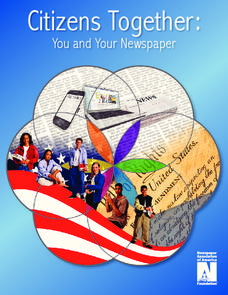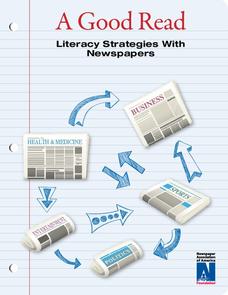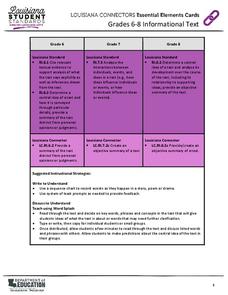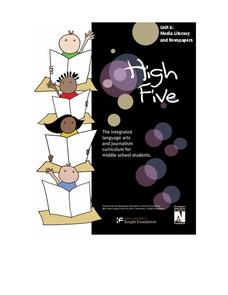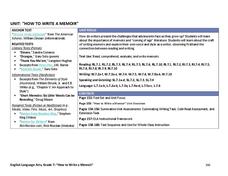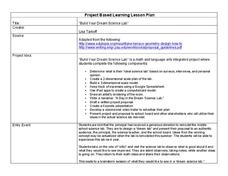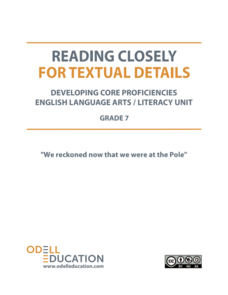National Woman's History Museum
Tea with Penelope: A 2-Point Perspective of the Edenton Tea Party
A brief introduction to Penelope Barker sets the stage for a discussion about political cartoons and the persuasive technique used to create them. A graphic organizer aids scholars in the analysis of a piece of work using a 2-point...
Echoes & Reflections
Contemporary Antisemitism
Despite the recognized atrocities of the Holocaust, anti-semitism continues. The 11th and final installment of the Teaching the Holocaust series explores the long-term effects of the Holocaust on modern anti-semitism, asking pupils to...
Echoes & Reflections
Perpetrators, Collaborators, and Bystanders
After the Holocaust, the world grappled with how to bring justice to the Nazis. But what to do with the thousands—if not millions—who allowed it to happen? Young historians consider the issues of guilt, collaboration, and responsibility...
Echoes & Reflections
Antisemitism
Propaganda and anti-semitism were linked to evil ends during the Holocaust. Using video testimony of Holocaust survivors, examples of Nazi propaganda, and discussion questions, learners explore the roots of anti-semitism in Europe and...
College Board
Evaluating Sources: How Credible Are They?
How can learners evaluate research sources for authority, accuracy, and credibility? By completing readings, discussions, and graphic organizers, scholars learn how to properly evaluate sources to find credible information. Additionally,...
Stanford University
Declaration of Independence
Scholars work in pairs to decide whether leaders wrote the Declaration of Independence for the rich and powerful or for every man. To draw their conclusion, pairs read excerpts from two historians and complete a graphic organizer citing...
Newspaper Association of America
Celebrating Women’s History Month
Examine the lives of four women—Blanche Stuart Scott, Madeleine L'Engle, Margaret Evans Price, and Sybil Ludington—in a 23-page activity packet. Each profile comes with a set of vocabulary and reading comprehension questions. Further...
Newspaper Association of America
Citizens Together: You and Your Newspaper
Not all news in a newspaper comes in the form of a traditional article; photographs, charts, and even editorial cartoons help spread important information, too. A civics-based unit describes the parts of the newspaper as tools for...
Social Media Toolbox
Social Media Usage
Is there a difference in the way organizations present news via social media and in print? The third in a series of 16 lessons from The Social Media Toolbox explores news outlets and their delivery methods. Groups follow a story for a...
American Bar Association
News Literacy Model Curriculum in Social Studies
Scholars investigate news literacy in the twenty-first century. They use technology, legal decisions, writings, and digital privacy to analyze the topic. Using what they learned, a group assignment looks into both the challenges and...
Newspaper Association of America
A Good Read
Teach your readers strategies for breaking down informational texts. Pupils develop and implement the tools they'll need to decode texts for the rest of their lives with an informational resource that focuses on the structure and...
Louisiana Department of Education
Essential Elements Cards
Use essential elements cards to help lesson plan! Each card contains an informational text common core standard for grade levels six through eight and suggestions for activities and supports. Cards address skills such as citing textual...
American Press Institute
High Five: Media Literacy and Newspapers
Teach the five different types of media with the first of three in a media literacy unit. Learners create and propose a final newspaper project, which must address information covered throughout the unit.
American Press Institute
High Five: Go to Press
High school scholars learn valuable information about how to run a newspaper in the third and final installment of a media literacy series. The unit scaffolds learners to success with background information before they plan for...
Southern Poverty Law Center
Analyzing How Words Communicate Bias
Words are powerful ... can your class choose them wisely? Scholars evaluate news articles to discover the concepts of tone, charge, and bias during a media literacy lesson. The resource focuses on recognizing implicit information and...
Louisiana Department of Education
How to Write a Memoir
Who are we and what shapes our identities? Seventh graders work to answer this question as they learn how to write a memoir. Full of non-print resources and supplemental texts that range from fiction to non-fiction, scholars write their...
PBS
Evolution of the Presidency: Theodore Roosevelt to Franklin D. Roosevelt
How much power should a president be allowed to exert? Theodore Roosevelt and Franklin D. Roosevelt exercised their power according to their interpretations of the United States Constitution, and these interpretations affected the...
Fluence Learning
Writing Informative Text: Did Shakespeare Write Shakespeare?
William Shakespeare penned some of the richest and most fascinating works of literature—or did he? Middle schoolers read three brief informative passages and conduct additional research to evaluate the claim that Shakespeare did not...
Fluence Learning
Writing an Argument: Is Electronic Communication Helpful or Harmful?
Technology has undoubtedly improved the lives of people around the world—but has it improved communication? Seventh graders read two informative passages about the rise of texting and emailing versus in-person conversations before...
National Park Service
Civil War to Civil Rights: From Pea Ridge to Central High
Explore how the Civil War impacted the Civil Rights Movement. Class members complete a series of projects for a unit that uses a layered curriculum approach to learning.
Curated OER
Build Your Dream Science Lab
Would your ideal science lab be filled with bubbling beakers and zapping Tesla coils? Or would it contain state-of-the-art computer technology and data analysis? Dream big with an innovative lesson that connects math and language arts...
C-SPAN
Presidential Candidate Research
Don't let the young citizens in your social studies class get all their election information from inflammatory commercials and arguing pundits. Use a lesson plan from C-SPAN to guide class members through an election season with a...
Odell Education
Building Evidence-Based Arguments: “Doping can be that last 2 percent.”
Even the most thrilling sports career can end in an asterisk if the player uses performance-enhancing drugs. Focused on the topic of doping in sports, a seventh grade unit breaks down the arguments for and against steroids in five...
Odell Education
Reading Closely for Textual Details: Grade 7
Enhance the reading experience with a set of lessons designed to improve textual analysis. Seventh graders use guiding questions to read both informational text and literature closely in the first part of the unit. Next, they work on...









